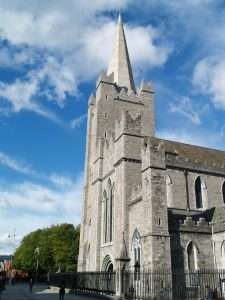Sermon for Saint Patrick’s Cathedral Past Choristers’ Association Evensong
“Meaningless! Meaningless!” says the Teacher.
“Everything is meaningless!” Ecclesiastes 12:8
Perhaps the Teacher from the book of Ecclesiastes is right, perhaps everything is meaningless, for what is there that endures? Money, fame, power, none of them outlast us, what is there that lasts?
One Sunday morning in the summer, Vlad Smishkewych, the presenter of Lyric FM’s Vox Nostra programme announced 12th July was an anniversary. Did anyone listening in Ireland not know it was an anniversary? Wasn’t the history of the island shaped by 12th July being an anniversary? Smishkewych went on to say that 12th July was the five hundred and forty-eighth anniversary of the birth of the Spanish composer Juan del Encina. Born on 12th July 1468, Encina was educated at the University of Salamanca and became renowned composer, poet and playwright before his death in Toledo in 1529. Encina pre-dated William Shakespeare by a century, yet, Vlad Smishkewych was able to play Encina’s Todos Los Bienes Del Mundo, a piece written around 1500.
There was a profound sense of reassurance in listening to Encina’s work, a profound realization that beauty is the only thing that endures, that while everything else might be meaningless, beauty would last. In a century where arrogant bombast and a visceral xenophobia have become the norm of political life, there is a reassurance that politicians are forgotten almost as soon as they leave office, and that all that will endure are the things that some of them would most despise.
Perhaps the early part of the twenty-first century will leave behind little that will be memorable, perhaps there will be no works comparable with those that emerged in the great eras of visual art, music and literature. Perhaps there will be no painter comparable with those of the Renaissance, perhaps there will be no composer comparable with those played by Vlad Smishkewych, perhaps there will be no literature to compare with that left us by the writers of the Sixteenth Century, but if the twenty-first century does leave any legacy, then that legacy will be whatever beauty might be mustered.
If we needed a reminder that beauty is what endures, the centenary commemorations of the Great War should be a lesson to those who would aspire to be remembered. The people still remembered are not the politicians or the generals, they are the poets. Brooke and Owen and Sassoon command a place in posterity; in hideous realities they found inspiration for lines that have endured for a century, and will probably endure for centuries more.
The mood of 2016 is one of anti-intellectualism; it’s a mood of contempt for those labelled as “experts,” it’s a mood expressed in a mocking of liberalism and tolerance, it’s a mood reflected in political leadership on both sides of the Atlantic. It’s a mood that will be long forgotten when Juan del Encina is still being played.
In his novel The Idiot, the nineteenth-century Russian writer Fyodor Dostoevsky has a character Prince Lev Nikolaevich Myshkin who is is mocked because he has a belief that beauty can save people from the worst:
Is it true, prince, that you once declared that “beauty would save the world”? Great Heaven! The prince says that beauty saves the world! And I declare that he only has such playful ideas because he’s in love!
The twentieth-century songwriter Don McLean saw the painter Vincent van Gogh as someone whose motivation was beauty, but who lived in a world without a place for such beauty.
Now, I understand, what you tried to say to me
And how you suffered for your sanity
And how you tried to set them free
They would not listen, they did not know how
Perhaps they’ll listen now
Perhaps McLean was right and Prince Myshkin was wrong. Perhaps beauty cannot save the world from xenophobia and fundamentalism, but beauty will be the only thing that outlives all the ugliness of our times.
Fr Rufus Halley, a Columban priest who was murdered in the Philippines fifteen years ago whilst attempting reconciliation work, once wrote, “’in the end we are saved by beauty”. I have thought about those words many times since then, “’in the end we are saved by beauty”. Beauty is about those things we can’t express, those things for which we cannot find words. Beauty is about those experiences that just cannot be explained. I think what Rufus Halley was saying was that the things that draw us to Jesus are not the things we can express in words, but the thoughts, the emotions, the feelings for which no words are ever adequate. The things about Jesus that attract people are things that we can only grasp at, moments we can only glimpse. Rufus Halley gave his life in the belief that it was beauty that changed people’s lives.
Even amongst the poverty of the southern Philippines, Rufus found beauty, beauty in the countryside, beauty in the love and friendship of the people, beauty in the courage and the faith of those who carried on despite their hardships and sufferings.
The ministry of this cathedral is a ministry of beauty, in music, in worship, it is about something that cannot be defined.
In the end we are saved by Jesus, the one who was himself beauty personified. May we be people of beauty because beauty is never meaningless.



Comments
Sermon for Saint Patrick’s Cathedral Past Choristers’ Association Evensong — No Comments
HTML tags allowed in your comment: <a href="" title=""> <abbr title=""> <acronym title=""> <b> <blockquote cite=""> <cite> <code> <del datetime=""> <em> <i> <q cite=""> <s> <strike> <strong>